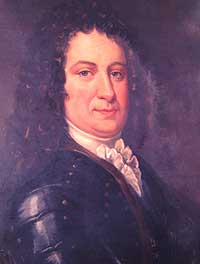Sir William Keith, 4th Baronet
This article needs additional citations for verification. (June 2015) |
William Keith | |
|---|---|
 | |
| Colonial Governor of Pennsylvania | |
| In office 1717–1726 | |
| Personal details | |
| Born | 1669 Scotland, United Kingdom |
| Died | November 18, 1749 (aged 79–80) London, United Kingdom |
Sir William Keith, 4th Baronet, (1669—18 November 1749) served as lieutenant-governor of the Colonies of Pennsylvania and Delaware, 1717 – 26.
History
Keith was born in Boddam Castle near Peterhead, Scotland to Sir William Keith, 3rd Baronet, of Ludquharn, Scotland and Lady Jean (Smith) Keith. He was baptised on 16 February 1680.[1] As eldest son, he stood to inherit the baronetcy from his father. He studied at Marischal College, the University of Aberdeen from which he graduated a master of arts in 1687. The Keiths were Episcopalian and of Jacobite sympathies, so much so that Keith resided with the exiled court of the Pretender, at Saint-Germain-en-Laye and there became one of the Pretender's favourites.
Upon Queen Anne's accession to the throne in 1702, the Act of Indemnity of 1703 was issued for former Jacobites, and many exiles returned to Great Britain. Keith was among these people, but quickly became involved in various Jacobite intrigues. In 1703, he was arrested under suspicion of treason.
Under the rule of the Tories, Keith received an appointment as surveyor-general of the customers for the southern district of North America in 1714 and took up residence in Virginia. However, he lost his office when the Whigs took power under George I. Around this same time, Keith's father became implicated in the Jacobite rising of 1715 and fled to Saint-Germain-en-Laye. Keith applied for a position as lieutenant governor of Pennsylvania and its three lower counties (now Delaware). He voyaged to England and returned to America with a commission.
Significance
While serving as lieutenant governor, Keith resided in a country manor, Graeme Park in Horsham, Montgomery County, Pennsylvania. Popular with the colonists, he organised a militia (no small feat in a Quaker colony) and established a high court of chancery. He also arranged peace conferences with the Indians and promoted laws allowing wives of sailors at sea to become femme sole traders. He also is noted for encouraging a then 17-year-old Benjamin Franklin to set up his own printing business in Philadelphia, though Franklin later claimed that Keith failed to come through with promised financial support. Keith suggested Franklin to travel to England in order to purchase the equipment to set up the print. However, after he embarked to England, Franklin realized that Keith was not going to sponsor him.[2]
In 1718, William Penn died and Keith became involved in disputes with Penn's widow regarding the conduct of the colony. He sought favour with the colonists and tried desperately to achieve popularity. Two years later, his father died, and he succeeded to his father's baronetcy. However, his father died insolvent and Keith too became mired in debt.
Penn's widow and heirs joined forces against Keith and sought the nomination of a new lieutenant-governor from the crown. Keith published a vindication and led an opposition party. He gained election to the assembly, but did not achieve the role of speaker which he sought. After re-election to the assembly the following year, he fled the colony and returned to England in order to evade his creditors. His family remained in Philadelphia.
On his voyage back to England, Keith wrote "A Short Discourse on the Present State of the Colonies in America with respect to the Interest of Great Britain," in which he warned of French encroachment on British colonial territory and proposed a stamp tax on colonists in order to finance standing armies. While in England, he gave assistance to the London Board of Trade in negotiating a treaty with the Cherokee and continued to write on colonial matters. His dire financial situation prevented him from returning to Pennsylvania to reunite with his family and he was unable to finance their passage to England.
Keith ended his life in financial ruin and spent time in debtors' prison. He died in the Old Bailey, London.
References
- ^ Graeme Park People: Sir William Keith
- ^ B. Franklin. The Autobiography of Benjamin Franklin. Eds. L.W. Labaree, R.L. Ketcham, H.C. Boatfield. Yale Nota Bene; 2003. p. 94-95.
External links
